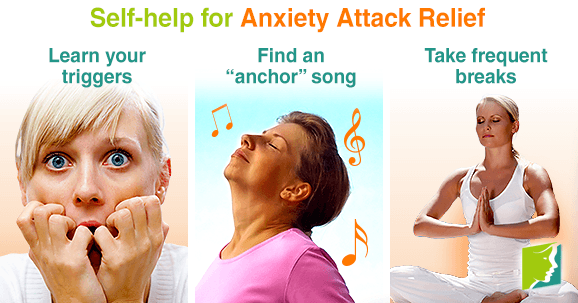Everybody has a fight or flight impulse that is triggered by stress or fear, allowing quick, successful decisions in the face of obstacles or danger. However, sometimes this impulse occurs even without an obvious trigger, bringing on inexplicable and paralyzing feelings of anxiety. As many as 40 million Americans suffer from some kind of anxiety disorder, and unfortunately, women going through menopause are no exception. In fact, women are twice as likely to suffer from these attacks as men. Anxiety attacks are extremely stressful and overwhelming, but there are ways to regain control if you are experiencing one.
Symptoms of Anxiety Attacks
Panic attacks happen suddenly, often with little or no obvious cause. Anxiety attacks can feel like a heart attack or a sudden breathing problem. During a panic attack, a person experiences some of the following symptoms:
- Increased heart rate or palpitations
- Excessive sweating, chills, or hot flashes
- Chest pain or discomfort
- Nausea or stomach pain
- Tingling or numbness in the extremities
- Inability to sleep or difficulty sleeping
- Shortness of breath or trouble breathing
- Dizziness or fainting
- Feelings of choking or suffocation
- Trembling or shaking
- Overwhelming dread, worry, or fear
- Fear of dying, impending doom, or losing control
Suggestions for Relief from Panic Attacks
Treatment for anxiety disorders can include a combination of psychotherapy and medication. However, the following ideas might also help:
Learn your triggers
Sometimes, panic attacks can occur because certain events, places, thoughts, people, or sensory information act as a trigger for feeling overwhelmed. It's good to recognize if the same things are bringing on your attacks. Then, instead of altering your life to avoid these things, you can take steps to address the thoughts and feelings that are giving you anxiety attacks.
Find an "anchor" song
Many therapists suggest combating anxiety with a calm and pleasant mental "anchor" that helps to bring you down and hold you steady amid the worst moments of an attack. Try to find a memory or a sensory stimulus, such as a song, that you strongly associate with being comfortable, stable, and happy. When you feel particularly anxious, call up your anchor and focus on that instead of your fear.
Take frequent breaks
Stress exacerbates anxiety attacks and should therefore be minimized, if possible. Don't be afraid to take breaks that correspond to the issues in your life, whether they are family or relationship worries, professional concerns, or personal uncertainties. When appropriate, step away from stressful situations to practice calm breathing, and get into the habit of changing negative mental patterns. Yoga and meditation also can help relieve tension.
Certain lifestyle changes can help combat anxiety. Exercising regularly, getting sufficient and restful sleep, and eating a healthy and consistent diet will not only increase general well-being, but also target some of the root causes of anxiety. It is important not to underestimate the power of taking care of your body; soon, you can have your anxiety and fears under your control.
Sources
- Rogge, T. (2015). Panic Disorder: MedlinePlus Medical Encyclopedia. Retrieved January 19, 2015, from http://www.nlm.nih.gov/medlineplus/ency/article/000924.htm
- Simon, H. (2013). Anxiety Disorders. University of Maryland Medical Center. Retrieved January 19, 2015, from http://umm.edu/health/medical/reports/articles/anxiety-disorders




